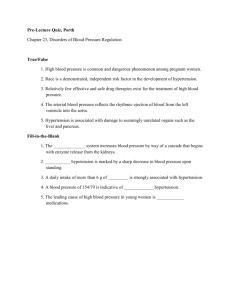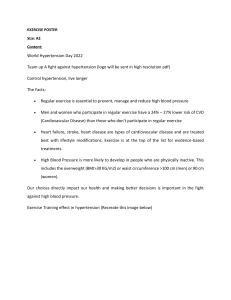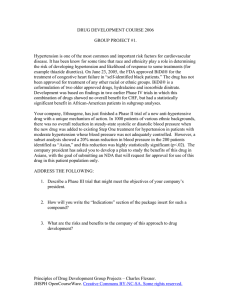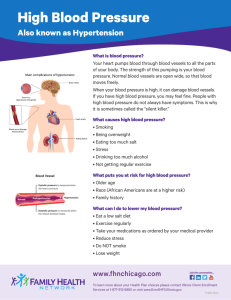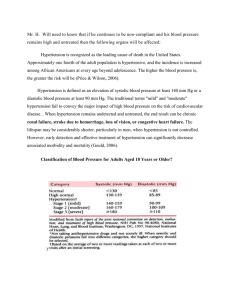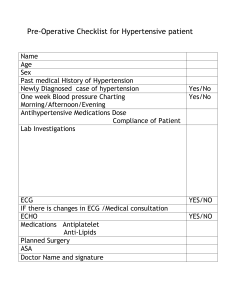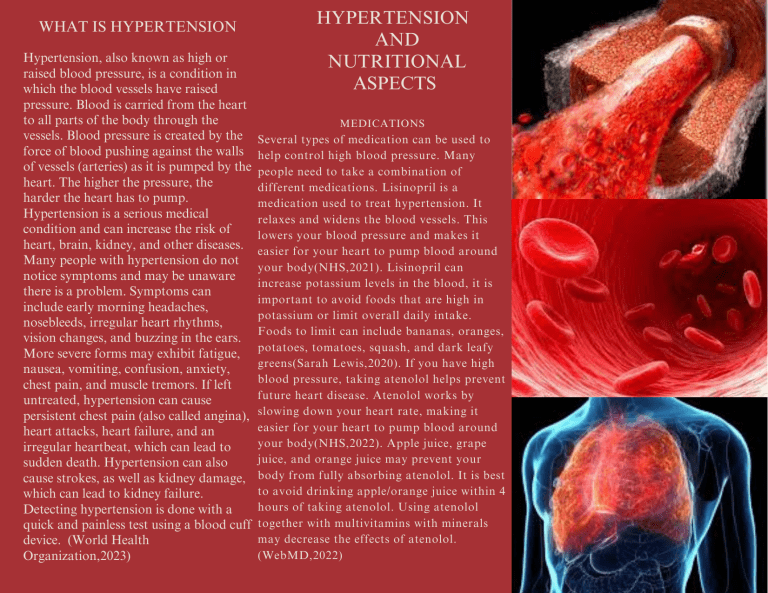
WHAT IS HYPERTENSION Hypertension, also known as high or raised blood pressure, is a condition in which the blood vessels have raised pressure. Blood is carried from the heart to all parts of the body through the vessels. Blood pressure is created by the force of blood pushing against the walls of vessels (arteries) as it is pumped by the heart. The higher the pressure, the harder the heart has to pump. Hypertension is a serious medical condition and can increase the risk of heart, brain, kidney, and other diseases. Many people with hypertension do not notice symptoms and may be unaware there is a problem. Symptoms can include early morning headaches, nosebleeds, irregular heart rhythms, vision changes, and buzzing in the ears. More severe forms may exhibit fatigue, nausea, vomiting, confusion, anxiety, chest pain, and muscle tremors. If left untreated, hypertension can cause persistent chest pain (also called angina), heart attacks, heart failure, and an irregular heartbeat, which can lead to sudden death. Hypertension can also cause strokes, as well as kidney damage, which can lead to kidney failure. Detecting hypertension is done with a quick and painless test using a blood cuff device. (World Health Organization,2023) HYPERTENSION AND NUTRITIONAL ASPECTS MEDICATIONS Several types of medication can be used to help control high blood pressure. Many people need to take a combination of different medications. Lisinopril is a medication used to treat hypertension. It relaxes and widens the blood vessels. This lowers your blood pressure and makes it easier for your heart to pump blood around your body(NHS,2021). Lisinopril can increase potassium levels in the blood, it is important to avoid foods that are high in potassium or limit overall daily intake. Foods to limit can include bananas, oranges, potatoes, tomatoes, squash, and dark leafy greens(Sarah Lewis,2020). If you have high blood pressure, taking atenolol helps prevent future heart disease. Atenolol works by slowing down your heart rate, making it easier for your heart to pump blood around your body(NHS,2022). Apple juice, grape juice, and orange juice may prevent your body from fully absorbing atenolol. It is best to avoid drinking apple/orange juice within 4 hours of taking atenolol. Using atenolol together with multivitamins with minerals may decrease the effects of atenolol. (WebMD,2022) FOODS THAT SHOULD BE INCLUDED IN DIET Eating vegetables(spinach, broccoli, kale), fruits(strawberries, oranges, and blueberries), and whole grains (Quinoa, brown rice, whole grain cereal) help reduce the incidences of hypertension if following the DASH diet(U.S. Department of Health,2021). Whole grains provide minerals like magnesium, which works with the calcium in low-fat dairy to improve your health. Fruits and vegetables provide potassium. Potassium reduces the effect of sodium and decreases the tension in your blood vessels(Borst,2023) FOODS THAT SHOULD BE AVIODED Fatty meats (Bacon, hotdogs, pork ), full-fat dairy (whole milk yogurt, full-fat cheese, Cottage cheese), and Sugarsweetened beverages (Soda, energy drinks, sweetened tea) should be avoided or limited in hypertension according to the DASH diet(U.S. Department of Health,2021). Fatty meats are high in saturated fats, cholesterol, and sodium, which can lead to hypertension. Regular consumption of low- and nonfat dairy products reduces blood pressure in adults with hypertension(Roy SJ,2019). Sugar-sweetened beverages add calories but don't fill you up, and people who drink them may not compensate for those extra calories by eating less food. That leads to weight gain, which can raise blood pressure(Harvard Health,2020). Resource for evidence based diet: The National Heart, lung, and Blood Resource on Disorder : The American Heart association References Alfreda, Ashley, Shahbazi, S., & Francis, L. (2022, April 13). Hypertension: Nursing care management and study guide. Nurseslabs. P Foëx, DPhil FRCA FMedSci, JW Sear, PhD FRCA, Hypertension: pathophysiology and treatment, Continuing Education in Anaesthesia Critical Care & Pain, Volume 4, Issue 3, June 2004, Pages 71–75. Academic.oup.com World Health Organization. August 5, 2021.(n.d.). Hypertension. World Health Organization. Sarah Lewis, P. D. (2020, June 9). What foods should be avoided when taking lisinopril? Healthgrades. WebMD. 2022. (n.d.). Atenolol oral: Uses, side effects, interactions, pictures, warnings & dosing. WebMD Borst, H. (2023, March 8). Want to lower your blood pressure naturally? The Checkup. U.S. Department of Health and Human Services. 2021. (n.d.). Dash eating plan. National Heart Lung and Blood Institute. Roy SJ, Lapierre SS, Baker BD, Delfausse LA, Machin DR, Tanaka H. High dietary intake of whole milk and full-fat dairy products does not exert hypotensive effects in adults with elevated blood pressure. Nutr Res. 2019 Harvard Health. Sugary drinks seem to raise blood pressure. . (2020, December 10).
